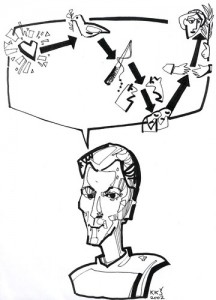CC201 has started off the semester by dabbling, among other things, in Machiavelli’s The Prince. Many were acquainted with the work from their high school years, and many were not – all admit it remains potent and relevant today. This post for The National Interest highlights the way in which The Prince still shocks today. A sample:
Drawing on examples from the Roman emperor Caracalla to the Florentine Cesare Borgia, Machiavelli offers advice for any would-be prince. First and most fundamentally, do whatever is necessary to preserve your power and secure your state. Beware of causing another to become powerful, or of joining forces with a more powerful state, for you will only bring ruin on yourself. Second, be skilled in warfare, “the only art expected of a ruler”. Keep the state on a perpetual war footing and maintain sufficient arms and soldiers to secure your realm from outside aggressors and internal rivals. Treat “peace” as nothing more than breathing space to prepare for another conflict. Ignore just war theory. A war is “just” when it is necessary—no more, no less.
…
Wicked stuff. And yet Machiavelli is no sadist. Unscrupulous means are justified only if they serve one specific end, in the words of Kenneth Waltz, preserving “your power in the state and your state among others.” He does not advocate mindless violence or gratuitous cruelty—not because he is squeamish, but because they are counterproductive. Machiavelli thus counsels prudence as a core element of princely leadership.
…
Particularly disturbing to contemporary readers is Machiavelli’s lack of remorse about the ruthless statecraft he advocates. There is no sugar-coating for him, no effort to comfort the reader. Wholly absent is the tragic tone of later realists like Hobbes and Rousseau—or, more recently, Morgenthau, Waltz, and Mearsheimer. For these writers, power politics and recurrent war are existential, dispiriting, and regrettable facts, the unavoidable structural byproducts of an anarchical, self-help system that compels each state, like the participants in Rousseau’s famous “stag hunt”, to look after its own interests—and devil take the hindmost.
…
Machiavelli’s contributions to the tradition of political realism are enduring. They include his admonition to take the world as it is, rather than it should be; his recognition that power and self-interest play a paramount role in political affairs; his insight that statecraft is an art, requiring political leaders to adapt both to enduring structures and changing times; and his insistence that the dictates of raison d’état may conflict with those of conventional morality. It is this last contention—that the public and private spheres possess their own distinct moralities—that remains so jarring today.We live, after all, in an age of democratic sovereignty, in which “princes” are elected by citizens and, as government officials, are expected to conduct themselves with probity, transparency and accountability. The global normative context for statecraft has also changed profoundly, thanks in large measure to the expansion and international codification of individual human rights. Much of the state-sanctioned violence taken for granted in Machiavelli’s day—whether the conquest of empires, the taking of slaves, or the commission of atrocities—is both legally and morally impermissible today, thanks to the expansion of human-rights law, humanitarian law, the laws of war, and the proliferation of international norms, treaties, and institutions defining certain acts as beyond the pale, authorizing sanctions or intervention to put an end to them, and providing judicial mechanisms to hold perpetrators accountable. Atrocities and illegal acts still occur, as Darfur or Syria remind us. But standards of legality and legitimacy have evolved, making these the exception rather than the norm.
In other respects, though, The Prince holds up well as a guide to politics, domestic and foreign. His accounts of official corruption in Florence, of decadence in the late Roman empire, and of deception by Italian popes would raise few eyebrows in contemporary Washington, D.C. Nor would modern readers be surprised to learn that in political life, it is more frequently the sinners than the saints that rise to power and cling to their positions.
A beguiling work.
Read up on our previous posts, What Machiavelli Knew, Formichelli introducing Corgan on Machiavelli, and on a lighter note, Recipe for Bolognese Machiavelli!

